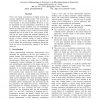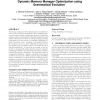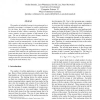RTAS
2000
IEEE
14 years 4 months ago
2000
IEEE
—Many embedded systems operate under severe power and energy constraints. Voltage clock scaling is one mechanism by which energy consumption may be reduced: It is based on the fa...
ISQED
2000
IEEE
14 years 4 months ago
2000
IEEE
Power and energy consumption of digital systems may increase significantly during testing. This extra power consumption due to test application may give rise to severe hazards to ...
CODES
2000
IEEE
14 years 4 months ago
2000
IEEE
One of the challenging tasks in code generation for embedded systems is register allocation and assignment, wherein one decides on the placement and lifetimes of variables in regi...
HUC
2009
Springer
14 years 4 months ago
2009
Springer
Personal energy consumption, specifically home energy consumption such as heating, cooling, and electricity, has been an important environmental and economic topic for decades. De...
GECCO
2009
Springer
14 years 4 months ago
2009
Springer
New portable consumer embedded devices must execute multimedia applications (e.g., 3D games, video players and signal processing software, etc.) that demand extensive memory acces...
EUROSSC
2009
Springer
14 years 4 months ago
2009
Springer
Finding solutions for the current period of climate change or “global warming” is possibly the most serious and pressing challenge faced by scientists and the wider community t...
CF
2009
ACM
14 years 4 months ago
2009
ACM
Energy consumption and heat dissipation have become key considerations for modern high performance computer systems. In this paper, we focus on non-clairvoyant speed scaling to mi...
GECCO
2010
Springer
14 years 4 months ago
2010
Springer
Technology scaling has offered advantages to embedded systems, such as increased performance, more available memory and reduced energy consumption. However, scaling also brings a...
SPAA
2010
ACM
14 years 4 months ago
2010
ACM
Energy consumption by computer systems has emerged as an important concern. However, the energy consumed in executing an algorithm cannot be inferred from its performance alone: i...
DATE
2002
IEEE
14 years 4 months ago
2002
IEEE
The number of embedded systems is increasing and a remarkable percentage is designed as mobile applications. For the latter, the energy consumption is a limiting factor because of...



